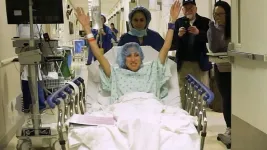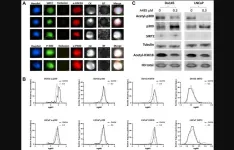(Press-News.org) Based on findings from a study published today in the journal, The Lancet Regional Health – Americas, researchers at Johns Hopkins Medicine and three collaborating medical institutions suggest that people living with the human immunodeficiency virus (HIV) who donate a kidney to other people living with HIV (PLWH) have a low risk of developing end-stage kidney disease (ESKD) or other kidney problems in the years following the donation.
“This new evidence is proof-of-concept that donating a kidney can be safe for people living with HIV,” says Christine Durand, M.D., associate professor of medicine at Johns Hopkins Medicine and medical director of the Johns Hopkins Transplant Research Center. “When added to the consistently positive outcomes documented for recipients of these organs, our study provides support that living donations from people with HIV to recipients with HIV can and do work.”
When the HIV Organ Policy Equity (HOPE) Act was enacted in 2013, it enabled people diagnosed with HIV to legally donate organs to others living with the virus and in need of transplants, as part of approved clinical research studies. The first living donor HIV-to-HIV kidney transplant in the United States under the HOPE Act was done at Johns Hopkins Medicine in March 2019. For the new study, the donor in that historic operation, Nina Martinez, along with the second and third PLWH in the nation to undergo the procedure, were monitored for two to four years post-transplant to document and assess their long-term outcomes.
The study was conducted at selected centers within the HOPE in Action Consortium, a U.S. group involving some 30 transplant centers approved to do HIV-to-HIV deceased donor kidney and liver transplants. A few of the centers have active protocols to perform living donor HIV-to-HIV kidney transplants, which remain restricted to research.
The reason for the study, the researchers explain, was to address concerns that nephrectomy (surgical removal of a kidney) might increase the risk of ESKD in living donors with HIV. PLWH are known to be at higher risk of kidney disease resulting from HIV infection, liver toxicity from antiretroviral therapies (medications used to keep HIV in check), hypertension and diabetes.
Martinez, age 35 at the time of donation, and the other two donors studied — Karl Neumann, age 52 at the time, and Reed Benedict, age 47 at the time — all agreed to be named within this paper and are listed as study authors. They were evaluated at HOPE in Action Consortium centers at three months, six months and annually for two to four years following their nephrectomies. The visits included a physical exam, sample collection for laboratory work, and interviews to document any hospitalizations, medication changes, serious adverse effects in general, or three or more nephrectomy-related adverse effects.
Pre-transplant biopsies for all three donors had shown no kidney disease. Additionally, the pre-transplant nine-year risk for developing ESKD was calculated for each of the donors, with all having low risks.
To assess kidney function, the researchers used a common blood test for measuring the level of a waste product called creatinine. The amount of creatinine found, when plugged into a mathematical formula, determined each donor’s estimated glomerular filtration rate (eGFR), the ability of their remaining kidney to filter waste products and fluids from the body as urine.
At two, three and four years assessment following donation, all three donors experienced slight decreases in eGFR. However, the study authors say these changes were expected, are comparable to post-transplant eGFR decreases seen in kidney donors who do not live with HIV, and do not indicate that the donors in this study are progressing toward chronic kidney disease or kidney failure. The authors also report that all nephrectomy-related adverse effects that arose were easily managed.
“Hopefully, our findings demonstrating positive outcomes for these three people living with HIV who donated a kidney will encourage other Americans living with HIV to consider living donation,” says Durand. “Having more organs available for HIV-to-HIV transplants helps everyone waiting on a transplant, regardless of HIV status, and could save hundreds of lives each year.”
Durand and her colleagues caution that the lifetime risk of ESKD in PLWH who become living donors remains unknown. They say that larger studies with longer periods of following donors are needed to address that concern.
“Knowing the importance of organ donation, I was thrilled that the HOPE Act made it possible for me to become both a registered deceased organ donor and the nation’s first living donor with HIV,” says Martinez. “With the findings from our study and hopefully, those from research to come, another barrier to living donor HIV-to-HIV kidney transplants — the concern that the donor’s remaining kidney cannot function independently of the donated organ — is being erased.”
Along with Durand and the three kidney donors, the members of the study team include: Fawaz Al Ammary, Willa Cochran, Derek Fine, Tao Liang, Abimereki Muzaale and Aaron Tobian from Johns Hopkins Medicine; Arthur Baker and Cameron Wolfe from Duke University School of Medicine; Michelle Callegari, Zachary Dietch, Leah Goudy, Aneesha Shetty and Valentina Stosor from the Feinberg School of Medicine at Northwestern University; Allan Massie and Dorry Segev from New York University Grossman School of Medicine; and Cheryl Winkler from the National Cancer Institute’s Frederick National Laboratories for Cancer Research.
The study was funded by grant number U01AI134591 from the National Institute of Allergy and Infectious Diseases, National Institutes of Health.
Durand reports serving on a grant review committee for Gilead Sciences. Segev reports serving as a consultant and receiving honoraria for speaking from Sanofi, Novartis, CSL Behring, Jazz Pharmaceuticals, Veloxis Pharmaceuticals, Mallinckrodt Pharmaceuticals and Thermo Fisher Scientific. Shetty reports serving on an advisory board for Veloxis Pharmaceuticals.
All other study authors report no conflicts of interest.
END
Study shows positive outcomes for first three U.S. living HIV-to-HIV kidney transplant donors
Long-term evaluation bolsters support that being a donor is safe for people living with HIV, making it possible to extend life for their recipients
2023-07-24
ELSE PRESS RELEASES FROM THIS DATE:
Webb detects water vapor in rocky planet-forming zone
2023-07-24
Water is essential for life as we know it. However, scientists debate how it reached the Earth and whether the same processes could seed rocky exoplanets orbiting distant stars. New insights may come from the planetary system PDS 70, located 370 light-years away. The star hosts both an inner disk and outer disk of gas and dust, separated by a 5 billion-mile-wide (8 billion kilometer) gap, and within that gap are two known gas-giant planets.
New measurements by NASA’s James Webb Space Telescope’s MIRI (Mid-Infrared Instrument) have detected water vapor in the system’s inner disk, at distances ...
Diagnosis of cystic fibrosis often missed or delayed, especially in non-White infants
2023-07-24
Ann & Robert H. Lurie Children’s Hospital of Chicago is leading an awareness campaign that aims to reduce missed or delayed diagnosis of cystic fibrosis after newborn screening, especially in non-White infants. In its first phase, the campaign targets primary care providers and public health officials, so that treatment can start earlier, which is linked to better outcomes for people with cystic fibrosis. The general public phase is expected to follow within the year.
Funded by the Centers for Disease Control and Prevention ...
Potent anti-cancer therapy created using ‘click chemistry’
2023-07-24
A potent anti-cancer therapy has been created using Nobel prize-winning “click chemistry”, where molecules click together like LEGO bricks, in a new study by UCL and Stanford University researchers.
The study, published in Nature Chemistry, opens up new possibilities for how cutting-edge cancer immunotherapies might be built in future.
The research team created an anti-cancer therapy with three components: one targeting the cancer cell, another recruiting a white blood cell called a T cell to attack the cancer cell, and a third knocking out part of the cancer cell’s defences.
Previously, ...
Claire K. Ankuda, MD, MPH (Mount Sinai Health System) recognized with AFAR 2023 Rising Star Award in Health Services and Aging Research
2023-07-24
New York, NY – The American Federation for Aging Research (AFAR), a national non-profit organization whose mission is to support and advance healthy aging through biomedical research, is proud to recognize the outstanding contributions of Claire K. Ankuda, MD, MPH, MSc with the 2023 Terrie Fox Wetle Rising Star Award in Health Services and Aging Research.
This award honors a health services researcher in an early or middle phase of his/her career who has already made important contributions with work that respects the value of multidisciplinary health services ...
Ming Xu, PhD (UConn) receives AFAR 2023 Vincent Cristofalo Rising Star Award in Aging Research
2023-07-24
New York, NY – The American Federation for Aging Research (AFAR), a national non-profit organization whose mission is to support and advance healthy aging through biomedical research, is pleased to recognize the exemplary contributions of Ming Xu, PhD, to the field of aging research through the 2023 Vincent Cristofalo Rising Star Award in Aging Research.
This award is named in honor of the late Dr. Cristofalo, who dedicated his career to aging research and to encouraging young scientists to investigate important problems in the biology of aging. Established in 2008, the award is a ...
NIH researcher Rafael de Cabo, PhD receives AFAR 2023 Irving S. Wright Award of Distinction
2023-07-24
The American Federation for Aging Research (AFAR), a national non-profit organization whose mission is to support and advance healthy aging through biomedical research, is pleased to recognize the exemplary contributions of Rafael de Cabo, PhD, to the field of aging research through the 2023 Irving S. Wright Award of Distinction.
This award is named in honor of AFAR’s founder and recognizes exceptional contributions to basic or clinical research in the field of aging. Established in 1982, the award is a framed citation and carries a cash prize of $5,000.
Dr. de Cabo is Senior Investigator of the ...
Muscadine wine shows promise in improving aging skin
2023-07-24
Could muscadine wine help perk up sagging skin? According to a new study, women who drank two glasses of dealcoholized muscadine wine daily showed significant improvements in the elasticity and water retention of their skin compared with those who consumed a placebo.
The study is the first time scientists have studied the impacts of nonalcoholic wine consumption on skin health in a randomized clinical trial. Researchers attribute the beneficial effects to chemical compounds called polyphenols that naturally occur in many plants.
“Muscadine grapes have been found to have a unique polyphenolic profile in comparison to other red wine varieties,” ...
Study explores how often children diagnosed with flu experience serious neuropsychiatric side effects
2023-07-24
While the incidence of influenza-associated neuropsychiatric events in children in the United States is unknown, the controversy over the use of a common antiviral medication typically administered to treat flu in children has sparked concern among parents and medical professionals alike.
The dilemma about whether the treatment causes neuropsychiatric events or if the infection itself is the culprit, led a group of pediatric researchers at Monroe Carell Jr. Children’s Hospital at Vanderbilt to study the question.
“Population-Based ...
Hebrew SeniorLife and Duke University receive $10.5 million award to study osteoporosis care in fracture patients
2023-07-24
Broken bones in later life are a leading cause of disability, recurrent fracture, nursing home placement, and death.
Prior studies have shown that health care providers can prevent poor outcomes, including death, by treating patients with bone-strengthening medications and by stopping risky medications that cause falls. However, few patients receive this high-quality care because it is time consuming and requires specialized knowledge that primary care providers may not have.
Researchers from Hebrew SeniorLife and Duke University will undertake a 5.5-year study that will compare two care models that have previously ...
A multiplex assay to assess activated p300/CBP in circulating prostate tumor cells
2023-07-24
“The results from this initial cohort support the integration of these biomarkers into prospective clinical trials.”
BUFFALO, NY- July 24, 2023 – A new research paper was published in Oncotarget's Volume 14 on July 20, 2023, entitled, “Development of a multiplex assay to assess activated p300/CBP in circulating prostate tumor cells.”
Reduced SIRT2 deacetylation and increased p300 acetylation activity leads to a concerted mechanism of hyperacetylation at specific histone lysine sites (H3K9, H3K14, and H3K18) in castration-resistant ...
LAST 30 PRESS RELEASES:
Kidney cancer study finds belzutifan plus pembrolizumab post-surgery helps patients at high risk for relapse stay cancer-free longer
Alkali cation effects in electrochemical carbon dioxide reduction
Test platforms for charging wireless cars now fit on a bench
$3 million NIH grant funds national study of Medicare Advantage’s benefit expansion into social supports
Amplified Sciences achieves CAP accreditation for cutting-edge diagnostic lab
Fred Hutch announces 12 recipients of the annual Harold M. Weintraub Graduate Student Award
Native forest litter helps rebuild soil life in post-mining landscapes
Mountain soils in arid regions may emit more greenhouse gas as climate shifts, new study finds
Pairing biochar with other soil amendments could unlock stronger gains in soil health
Why do we get a skip in our step when we’re happy? Thank dopamine
UC Irvine scientists uncover cellular mechanism behind muscle repair
Platform to map living brain noninvasively takes next big step
Stress-testing the Cascadia Subduction Zone reveals variability that could impact how earthquakes spread
We may be underestimating the true carbon cost of northern wildfires
Blood test predicts which bladder cancer patients may safely skip surgery
Kennesaw State's Vijay Anand honored as National Academy of Inventors Senior Member
Recovery from whaling reveals the role of age in Humpback reproduction
Can the canny tick help prevent disease like MS and cancer?
Newcomer children show lower rates of emergency department use for non‑urgent conditions, study finds
Cognitive and neuropsychiatric function in former American football players
From trash to climate tech: rubber gloves find new life as carbon capturers materials
A step towards needed treatments for hantaviruses in new molecular map
Boys are more motivated, while girls are more compassionate?
Study identifies opposing roles for IL6 and IL6R in long-term mortality
AI accurately spots medical disorder from privacy-conscious hand images
Transient Pauli blocking for broadband ultrafast optical switching
Political polarization can spur CO2 emissions, stymie climate action
Researchers develop new strategy for improving inverted perovskite solar cells
Yes! The role of YAP and CTGF as potential therapeutic targets for preventing severe liver disease
Pancreatic cancer may begin hiding from the immune system earlier than we thought
[Press-News.org] Study shows positive outcomes for first three U.S. living HIV-to-HIV kidney transplant donorsLong-term evaluation bolsters support that being a donor is safe for people living with HIV, making it possible to extend life for their recipients








